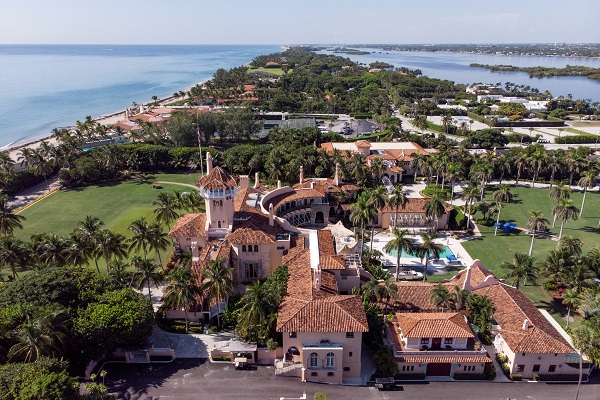 An aerial view of former US President Donald Trump's Mar-a-Lago home after Mr Trump said that FBI agents raided it, in Palm Beach, Florida, US, 15 August 2022;
Credit: Reuters / Marco Bello / File Photo
An aerial view of former US President Donald Trump's Mar-a-Lago home after Mr Trump said that FBI agents raided it, in Palm Beach, Florida, US, 15 August 2022;
Credit: Reuters / Marco Bello / File Photo
WASHINGTON (Reuters) - A federal judge has given the United States (US) Justice Department and Donald Trump's lawyers until Friday 9 September 2022 to come up with a list of potential candidates to serve as a special master to review records the FBI seized from the former president's Florida estate.
But finding people who have the necessary experience and security clearances to handle the highly classified documents (and the willingness to enter the political brushfire surrounding the probe) will be no small task, legal experts said.
"If we're talking about highly classified material, there's only a relatively small number of individuals who would satisfy the requirements of the job", said attorney Kenneth Feinberg, who served as a special master for the 9/11 Victims Compensation Fund.
"It would have to be somebody willing to take on the hurricane. It's not purely a security issue. It's become a political issue", he said.
One illustration of the challenge: the non-profit law firm National Security Counselors last week provided the court with a list of four potential candidates with expertise on executive privilege. All four have since made public comments that either suggest they do not want the job or that could be used to argue against them by lawyers for the Justice Department or Donald Trump.
On Monday 5 September 2022, US District Judge Aileen Cannon ruled that a special master should review the records seized from Mr Trump's Palm Beach home to weed out anything that should be kept from prosecutors, either due to attorney-client privilege or executive privilege - a legal doctrine that shields some White House communications from disclosure.
The US Supreme Court last year side-stepped the question of how far a former president's privilege claims can go in rejecting Donald Trump's bid to keep White House records from the 6 January select committee.
However, the US National Archives, after conferring with the Justice Department, told Mr Trump's lawyers earlier this year that he cannot assert privilege against the executive branch to shield the records from the FBI.
Special master
A special master is an independent outside expert who is sometimes tapped to review records seized by the government in sensitive cases where some of the material might be privileged.
Whoever is picked will likely need to have a top-level security clearance because more than 100 of the 11,000-plus documents are marked as top secret, secret or confidential.
A special master has never before been called on to determine whether records are covered by executive privilege, particularly in the unique circumstance of a former president asserting the right over the prerogative of the current president, Joe Biden.
"Appointing a special master I think may be harder than people think", said John Bolton, Donald Trump's former national security adviser who previously also served at the Justice Department. "How many people with TS/SCI [top secret/sensitive compartmented information] clearance are out there? And how many of them are experts on executive privilege?"
Some opt out
None of the four potential candidates identified by National Security Counselors in a court filing last week have openly embraced the idea.
One of them, Mark Rozell, the dean of the public policy school at George Mason University, has asked for his name to be removed from the list, telling Reuters: "Flattered that someone thinks I’m qualified, but I prefer analysing from the outside of events".
A second, former Justice Department attorney Jonathan Shaub, has not said whether he would take the job, but criticised Aileen Cannon's order in an interview with Reuters on Monday, saying it was "filled with inaccuracies about the law" and that the judge seemed to be "bending over backwards to help Trump".
Northwestern University law professor Heidi Kitrosser, the third, told Reuters that she believes she is unlikely to be selected, after some conservative media outlets and Donald Trump supporters on social media pointed to her prior political comments.
The fourth person, Mitchel Sollenberger of the University of Michigan-Dearborn, said he does not have a security clearance.
A Justice Department spokesman on Monday said the government is reviewing Aileen Cannon's order without commenting on next steps. Attorneys for Donald Trump did not respond to requests for comment.
Most prior cases involving special masters related to practicing attorneys who had a duty to keep their clients' records confidential.
A special master was appointed, for instance, after the FBI searched the homes and offices of former Donald Trump attorneys Rudy Giuliani and Michael Cohen.
Some legal experts said the best bet is to look for recently retired judges from Washington, DC or Florida who have handled national security cases and could easily get their clearance restored.
Robert Costello, an attorney for Rudy Giuliani, said that after the FBI seized items from his client's home and office, the government and the defence team were able to quickly agree on a special master candidate: retired judge Barbara Jones.
"They will try to whittle it down to one", he said, noting that they will look for someone who can be "neutral and fair".
If they cannot agree, he said, the judge can pick someone herself.
"The judge would be wise to make sure that it's a consensus candidate", said Kenneth Feinberg. "She may end up appointing somebody over the objection of one side or the other, but at least she's made an effort to determine and calibrate the degree of opposition".








